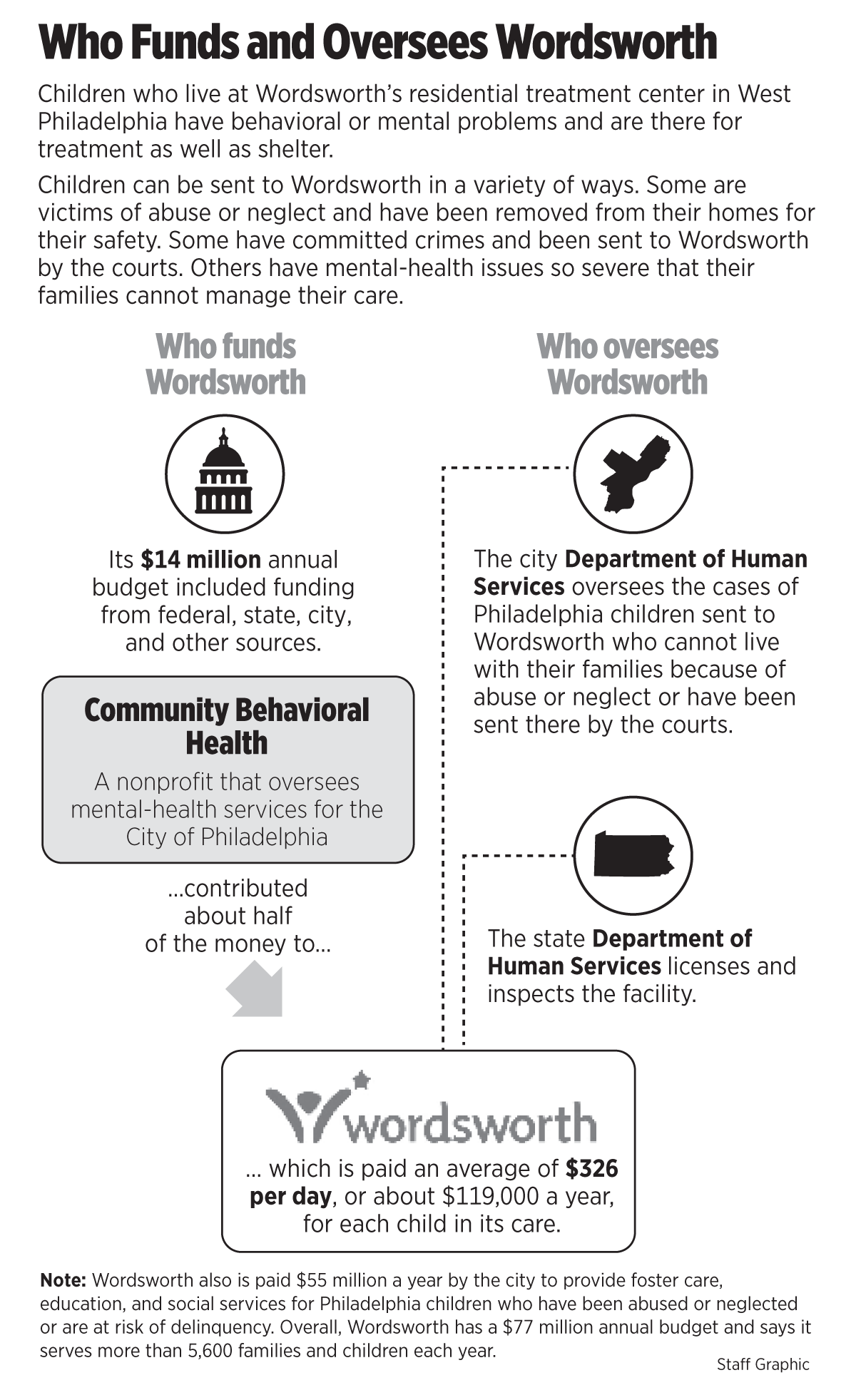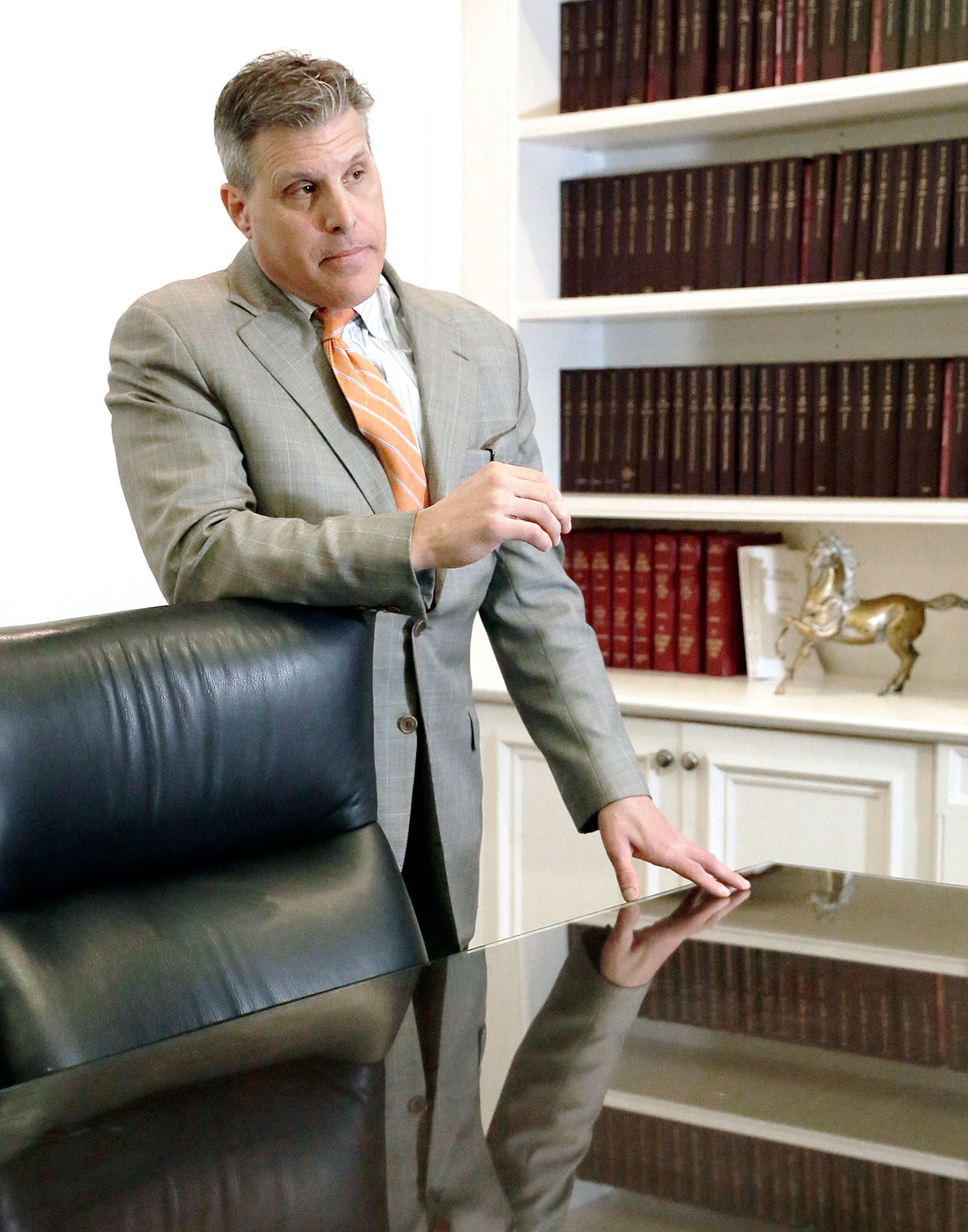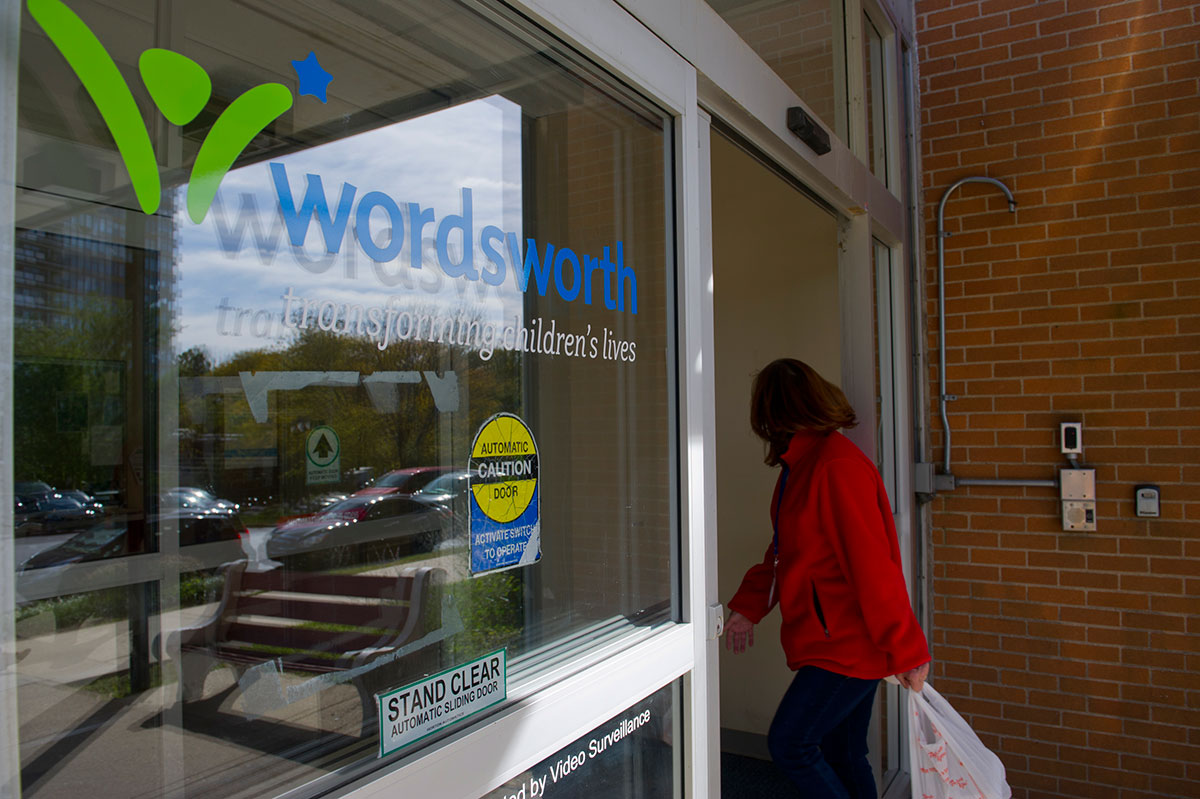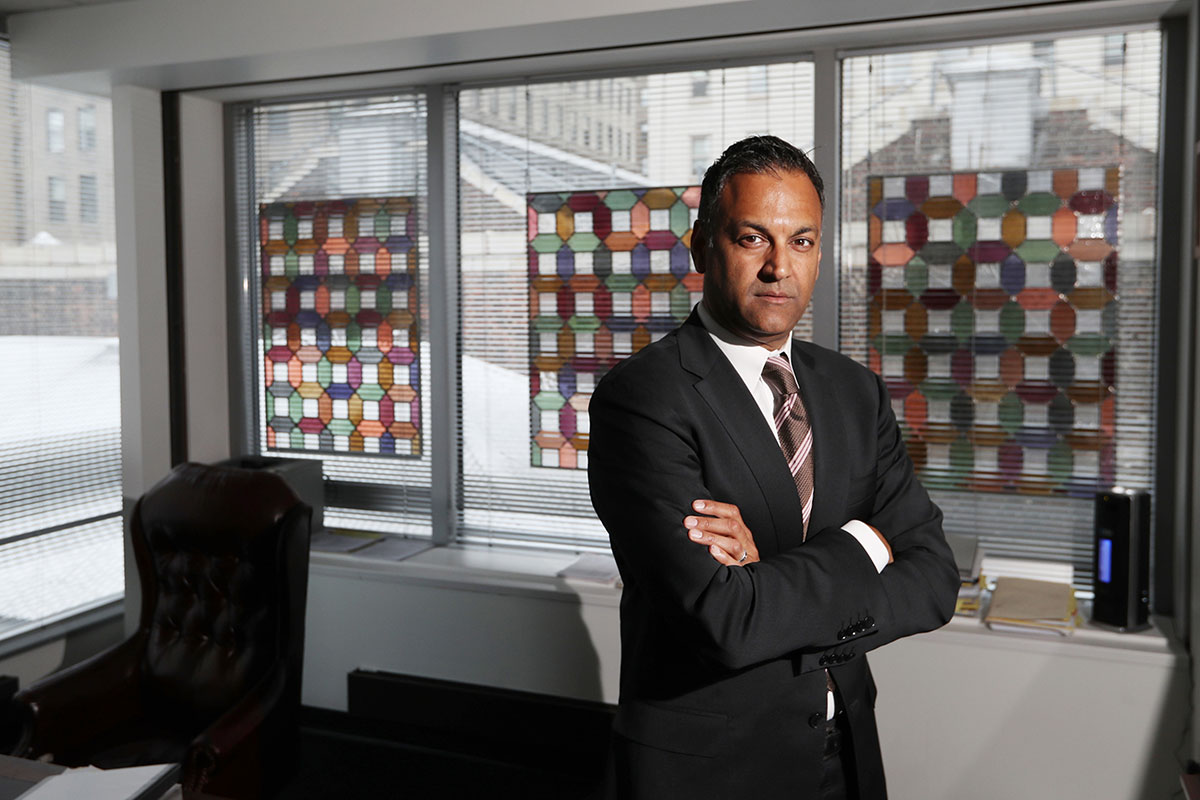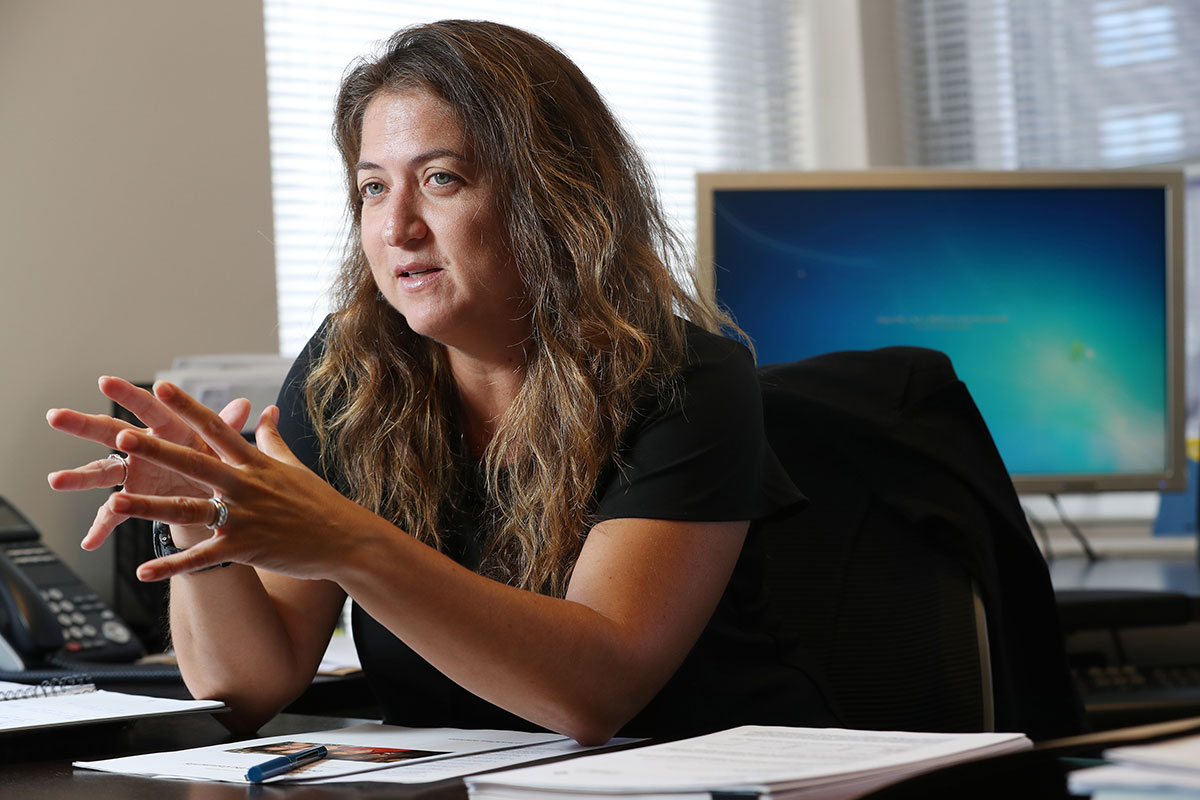Death, rapes, and broken bones at Philly's only residential treatment center for troubled youth
The October death of David Hess, 17, was yet another violent chapter in a hidden history of abuse at Wordsworth.

Shortly after David Hess died in a struggle with staffers at Wordsworth last fall, the state shuttered the West Philadelphia facility, decrying it as "an immediate and serious danger" to the children who lived there.
The death of Hess, 17 – ruled a homicide – was yet another violent chapter in a hidden history of abuse at the city's only residential treatment center for troubled young people. In the last decade, at least 49 sex crimes have been reported at Wordsworth, including 12 rapes and 23 accounts of sexual abuse, an Inquirer and Daily News investigation has found.
Interviews, court records, state inspection reports, and police records reveal a trail of injuries to children, from broken bones to assaults to the suffocation death of Hess. Along the way, lawyers, licensing inspectors, and others found conditions there appalling and sounded the alarm with little success.
In 2015, three girls at the center were sexually assaulted by a counselor who lured them with promises of money and gifts, they would later tell police. While rumors of the incidents swirled, Wordsworth officials were slow to investigate, and the girls say the assaults continued for weeks.
"I couldn't believe that. It's pretty outrageous," said Frank Cervone, executive director of the Support Center for Child Advocates, which represents victims of child abuse and neglect.
For Hess, who suffered from profound mental illness, and the other behaviorally challenged young people who called Wordsworth home, the center was supposed to be a refuge, a place to get needed help. Taxpayers shelled out $119,000 a year for the care of each child, but all too often reaped failure.
"He died a child," said Hess' sister, Elizabeth, 28. "He died a child in a facility designed to help him, and it didn't help him. It killed him."
"Exceptional hardships"
On the sprawling grounds of a former hospital on Ford Road, Wordsworth, a nonprofit, runs a variety of programs that aim to help children and families in need. The redbrick-and-glass residential treatment facility housed 82 young people the night Hess died. Many had been placed there by the city after suffering abuse or neglect. Others were ordered to stay there by juvenile court after committing a crime. All had mental illness or behavioral problems, posing severe challenges for their caregivers.
Ranging in age from 10 to 21, the young people in Wordsworth's care lived in a rundown facility and slept in rooms with holes in the walls, exposed wiring, broken light fixtures, and faulty heaters. There, records show, they were sometimes tended to by ill-trained staffers.
Despite its deficiencies, Wordsworth had its license renewed by the state Department of Human Services again and again, and child welfare agencies and the courts continued to send young people there.
DHS officials declined to explain its decisions to allow Wordsworth to operate after compiling a long history of violations. They said the agency is examining how it handled problems at Wordsworth and whether changes need to be made.
Officials at Wordsworth, which has appealed the closure order, declined to be interviewed and declined to respond to a detailed list of questions.
In a statement, Wordsworth's board chairman, Thomas V. Johnson, said: "At Wordsworth, there is no greater value we have than the responsibility to care for our children." He said many of the young people who live there "had experienced exceptional hardships in their lives with behavioral and other mental health issues."
Johnson said pending lawsuits prevented him from discussing specific incidents at the facility. However, he said, "we would like to state unequivocally that Wordsworth remains committed to ensuring a safe and secure environment for all children in our care." He also noted that in January Wordsworth hired a new CEO.
Community Behavioral Health, a nonprofit that oversees publicly funded mental-health services for the city, funneled about $6 million a year in state and federal money to Wordsworth to care for a steady stream of young people at an average cost of $326 per day.
The agency continued to write those checks even after it learned of serious problems at the facility, including sexual assaults.
“Our approach to agencies generally is that we need them, and if there are opportunities to improve, we work with them,” said Joan Erney, chief executive of Community Behavioral Health.
“We did rely on Wordsworth extensively,” she added. “Places outside of Philadelphia don’t want to take our kids. They tell us our kids are too complicated. They tell us our kids are too hard. We have kids with some really difficult problems.”
“Nobody believes you”
In the last decade, police were summoned to Wordsworth more than 800 times for incidents ranging from minor disturbances and tripped fire alarms to rape. Police records show reports of 12 rapes, two cases of involuntary deviate sexual intercourse, seven reports of indecent exposure, four cases of corruption of the morals of a minor, and one case of child endangerment. In addition, police were called to investigate 23 reports of sexual abuse, and six reports of physical abuse against children.
Police declined to provide details of those cases, but records obtained by the Inquirer shed light on some of those crimes, which began shortly after the center opened in 2006.
The next year, for instance, staffer Norman Thompson went to a 16-year-old girl's room at 4 a.m., touched her genitals, and forced her to touch his penis, court records show. Thompson, then 26, later pleaded no contest to indecent exposure and corruption of a minor and was sentenced to five years’ probation.
Another case that year turned out much differently. A girl, 13, told police a staffer came into her room one night and raped her. She told her social worker, who took her to the hospital and alerted police.
Other staffers were less supportive, said the woman, now, 23, whose name the Inquirer and Daily News are withholding because the newspapers do not identify victims of alleged sexual assault without their permission.
“They didn’t believe me when I told,” she said. “Nobody believes you. They all stick together.”
After she reported the assault, she said, she was moved to what Wordsworth called the “safe room” and she never saw her attacker again.
But word of her allegations spread through the facility, she said.
“People kept calling me a liar,” she said. “So I just told my social worker I didn’t want to do it [pursue the case] anymore, and they didn’t force me.”
The woman described Wordsworth as a violent place where young people fight among themselves and with the staff.
“That place was horrible,” she said.
Another woman reported a sexual assault by a staffer at Wordsworth in 2008 when she was 16. She said the man came into her room at night, assaulted her, and ejaculated on her.
Afterward, she remembered feeling confused. In ways that she now understands to be wrong, part of her felt good about it. “I was just happy that somebody touched me,” she said. “I never had a guy touch me because I was in placement for so long.”
The woman, now 25, said she and her brothers were removed from their home because their mother had mental problems and tried to harm them.
After the assault at Wordsworth, she said, she finally told her social worker. “She was like my mom because I’d been there for so long” — since age 11, the woman said. “She told me, ‘That’s wrong,’ and she reported it.”
The woman said she knew girls at Wordsworth who had sex with staffers. “They’d say, ‘Hey, Daddy.’ Like you call your man, ‘Hey, Daddy.’ ”
It was tolerated, she said. “Nothing came to light down there,” she said.
Among dozens of sex crimes reported at the facility, records show, arrests were made in just four cases. Those include the one involving Thompson and the arrest of a staffer charged with assaulting the three girls. Also charged were two boys, 16 and 13, accused in separate incidents of raping other boys at the center.
“They just lost track of the place”
Wordsworth, founded in 1952 as a school for children with reading disabilities, expanded rapidly in recent years.
Beginning in 2013, it won city contracts to provide foster care, education, and social services for children at risk of abuse, neglect, or delinquency, with public funding rising to $55 million a year. These contracts fueled enormous growth. Wordsworth grew into a behemoth organization with a $77 million-a-year budget that also runs a school and an acute psychiatric facility and says it serves more than 5,600 children and families each year.
As Wordsworth’s work expanded well beyond the troubled youth home, said Cervone, of the Child Advocacy center, “it's possible that they just lost track of the place.”
Over the years, inspectors from the state Department of Human Services repeatedly cited the facility for failing to ensure that its workers had the required training in the care and management of children.
“It’s like carrying a gun without a license. You either have it or you don’t,” said Steven F. Marino, a lawyer for the Hess family who plans to sue Wordsworth. “You’re either allowed to be around children or you’re not.”
Proper training in how to safely restrain a child is essential in facilities such as Wordsworth, where children can grow combative quickly, experts say. State officials warned Wordsworth about the importance of the proper use of restraint in inspections of the facility in 2012, 2013, 2015, and 2016. Wordsworth officials repeatedly pledged to be more diligent.
If staff aren’t trained in proper restraint techniques, “they use techniques they’d use in the street,” Marino said.
Lissy Sherman says that’s what she experienced at Wordsworth in 2008 when she was 17.
In an interview, Sherman, now 26, said it was “med call,” or time to get medication, and she didn’t come out of her room on time. A mental-health technician, Isaac Wilson, came in to get her, she said.
“He literally dragged me out the room pulling my clothes, dragging me, pulling me,” she said.
"You could see my bone sticking out."
— Lissy Sherman, who was injured at Wordsworth when she was 17
As it happened, her friend saw the attack. “He had her on the ground and bent her arm back,” the woman recalled. “She was crying.”
During the struggle, Sherman said, her arm was fractured. “You could see my bone sticking out.”
Sherman remembers that Wilson turned to her and said: “I didn’t do that.”
A lawsuit Sherman’s mother later filed on her behalf said the injury to her arm required surgery to realign the bone. In court papers, a lawyer for Wordsworth said Sherman had been “combative and aggressive” and contributed to her own injury.
The suit was settled for a sum not disclosed in court documents. Sherman said she was paid $47,000.
In another incident, a 17-year-old girl suffered a broken jaw in 2010 in a struggle with a staffer who was trying to break up a fight she was having with another girl. Shakara Holly said in court papers that the staffer, Ahmadou Mbengue, used “unusually harsh force” as he attempted to restrain her. Lawyers for Wordsworth and Mbengue denied that and the lawsuit ended when Wordsworth agreed to pay an undisclosed sum.
Then came a terrible event that reverberated outside the Wordsworth campus. In April 2015, a 16-year-old boy at Wordsworth was awakened at 4:30 in the morning by another boy who forced him to perform oral sex and then pushed him to the floor and raped him.
At the time of the assault, Craig Roberts, who was sent to Wordsworth after committing a robbery and threatening to inflict bodily harm on someone, was supposed to be kept under one-on-one supervision, lawyers for the victim said. Instead, he was left alone and attacked the boy.
When the victim initially reported the crime, staffers were dismissive, the teen said, and he had to beg to be taken to the hospital. An exam there found tears in his anus. Police investigated and Roberts, now 18, was arrested and adjudicated delinquent on a sexual-assault charge.
The victim was moved to another wing at Wordsworth, where he was raped by a second attacker, he later told police.
These crimes and other troubling reports so concerned lawyers at the Defender Association of Philadelphia that they began holding monthly meetings with officials at Wordsworth and Community Behavioral Health. Also at the meetings were representatives of the city and its Department of Human Services, which is responsible for the care of children who have been abused or neglected or have been adjudicated delinquent after committing crimes; the state Department of Human Services, which licenses and inspects the facility; and representatives of Philadelphia’s juvenile probation department.
Wordsworth officials agreed to put cameras in the building and fix up conditions inside, Erney said. They also pledged to improve training.
But as part of their review, Community Behavioral Health officials neglected to read the state inspection reports on Wordsworth. Had they done so, they would have learned of lingering problems, including lapses in training, delays in medical care, injuries to children through improper restraints, and reported abuse.
The monthly meetings became bimonthly meetings. “Everyone seemed to think that they were on the right path, and we were going to go to every six months” for meetings, Erney said.
But several months later, in 2015, three girls, ages 15 to 17, reported repeated sexual assaults by residential counselor Isaac Outten. The girls said Outten took them to the basement for sex and forced them to take naked photographs of themselves with his iPhone.
He lured the 15-year-old to the basement by promising her diapers and milk for her 1-year-old child in exchange for oral sex and intercourse, she later told police. He promised another girl, 17, that he would help her with a criminal case in exchange for sex and naked selfies, police said.
And the third girl, also 17, told police Outten took her to the basement for sex after a counselor left her alone with him. She said he told her not to tell anyone or he would get in trouble.
Wordsworth suspended and later fired Outten after one of the girls told a counselor what happened. But some staffers had heard rumblings that Outten was having sex with one or more of the girls and they did nothing, according to a summary of interviews Wordsworth officials conducted in preparation for the defense of a lawsuit.
State DHS officials learned of at least one of the alleged rapes through its abuse hotline, Childline, in late November. A month later, the agency renewed Wordsworth’s license.
Outten, 38, was later charged with institutional sexual assault, involuntary deviate sexual intercourse, corruption of minors, child endangerment, and other crimes. He has pleaded not guilty and is awaiting trial. Through his lawyer, Outten declined to comment.
Nadeem A. Bezar, a lawyer with Kline & Specter who has sued Wordsworth on behalf of two of the girls, said the center breached its duty to them by allowing Outten to be alone with them.
“It is unfortunate that Wordsworth did not follow protocol that would have prevented their employee from preying on these vulnerable girls,” he said. He also faulted it for not investigating the rumors that Outten was having sex with the girls.
Cynthia Figueroa, commissioner of the city’s Department of Human Services, also decried the reported assaults on the girls. And she said she was horrified by the death of Hess.
Figueroa was new to the job when Hess was killed at Wordsworth and she visited the center days later to investigate. “I wanted to see it with my own eyes,” she said.
"You could feel the stress and tension when you walked into the building."
— Cynthia Figueroa, commissioner of the city’s Department of Human Services.
What she found shocked her. The place was in “horrible condition,” she said.
“It was not the conditions conducive to a child that would be in our care,” she said. “It was really worn down.”
The physical plant aside, Figueroa said, “you could feel the stress and tension when you walked into the building.”
Still, she said, some children told her that they were happy there, that the staff was like family, that they considered Wordsworth their home. Others wanted to leave.
Within days of the closure order, all of the children were sent to residential treatment centers in other states or to acute psychiatric facilities.
A stolen iPod, a death
On Oct. 13, three Wordsworth staffers entered David Hess’ bedroom in search of a stolen iPod. Two of them did not have the required annual training in the proper methods of restraining a child and should not have been allowed to work with children, state records show.
As they flipped over his bed and tossed furniture around his room in search of the iPod, the 5-foot-9, 149-pound Hess grew agitated and struggled with them. At one point, a staffer held him down while another punched him repeatedly in the ribs, witnesses later told state investigators.
“Get off me,” he cried, according to a state report on the incident. “I can’t breathe.”
And then, witnesses said, the room fell silent.
The city Medical Examiner’s Office ruled that Hess died from suffocation.
Just a few days earlier, Hess’ mother, Maryann Roth, had spoken to her son about his coming home for Christmas.
Roth, who adopted Hess and his two brothers when he was two, said it was too painful to talk about what happened to him at Wordsworth.
Born into a family with a history of mental illness, Hess was removed from his biological mother’s home in Germantown when he was a toddler. His birth mother was schizophrenic, drug-addicted, and given to bouts of anger, said Marino, the lawyer for the Hess family.
Hess and his brothers were adopted together and moved to Lebanon, Pa., where they lived with Roth, her husband, and five other children.
As he grew, Hess exhibited signs of mental illness, paranoia, explosive anger, and self-destructive tendencies.
“He was a very, very difficult child,” Marino said. “This child’s parents couldn’t manage him.” For a time, he was sent to live at the Bradley Center, a residential treatment facility in Pittsburgh that specializes in helping children with mental-health problems.
But officials there found him to be too much of a challenge, Marino said, and he was sent to Wordsworth.
“It’s hard to find a setting for kids with these disabilities,” he said. “You’re dealing with a tough population.”
At the same time, he said, Wordsworth, in accepting the challenge of admitting and treating Hess, had a duty to help him. “Wordsworth says, ‘We’ll take on the responsibility.’ They take the money and they can’t manage him,” Marino said.
Law enforcement officials declined to comment but continue to investigate Hess’ death. Wordsworth paid for his funeral and tombstone.
To Elizabeth Hess, the loss of her brother’s life was senseless.
“An iPod,” she said. “Are we really OK with that being the cause of my brother’s death?”
Staff writer Mike Newall contributed to this article.
Contact Nancy Phillips at 215-854-2254 or nphillips@phillynews.com
